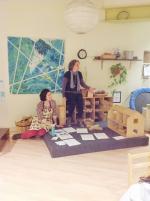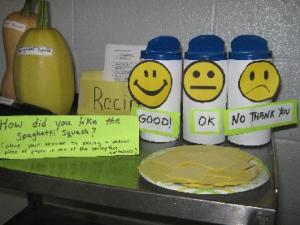A Community of Early Childhood Educators
On a chilly evening last November, a group of early childhood educators were playing an auditory game on the playground outside the VNA Family Room in Burlington, VT. They were pressing clickers to find one another in the growing dark.
What were adults doing playing a kids game (with no kids), long after school hours, on the tail end of an already exhausting work day?
Easy. These twenty four educators are part of a new Shelburne Farms professional learning community, or PLC, focused on the “hows and whys” of bringing children outdoors to play and learn, and on embedding farm to preschool into their curriculum.
PLCs are not a new idea in eduction. They're designed to give educators time and space to reflect, learn, share, and support each other in growing their teaching practice. For early childhood educators, that opportunity is rare.
Shelburne Farms has worked with early childhood educators for years. Like many others, we’ve noticed how academic expectations from elementary grades are being pushed down into kindergarten and preschool. Teachers are stressed and frustrated by being forced to teach what they feel is developmentally inappropriate for their students. This includes less time for unstructured play.
The PLC lets educators examine not only how their teaching can embrace and restore outdoor play, but also how to share its importance with parents and administrators.
Each monthly session (there are six total), is held in a different school so we can see how they use their space both indoors and out. Each also focuses on a different topic, ranging from designing outdoors spaces to the teacher’s role in outdoor play to food equity and justice. Participants have “homework” readings to discuss, and share in taste tests.
In January, Burlington Children’s Space hosted our third PLC, focused on food in the preschool. BCS’s director, Sarah Adams-Kollitz, and its “lunch lady,” Erinn Simon, shared their story of how BCS has slowly grown its food program with help from the community: The Intervale shares gleaned produce and City Market donates food for bimonthly family dinners at the school. Both women stressed that this work started slowly and has grown as the Center has tried to bridge the food gap for all families.
In discussion, participants explored their feelings and language around food and eating with children. They then made commitments in answer to one question: “What is the one thing regarding food that you want to impart to your students?” Here are a few answers:
- "That food is one of the most important parts of our lives & we should treat it with respect & gratitude."
- "I want kids to explore food without fear."
- "I want my students to feel good when they eat & feel good about their choices after."
- "Educate & encourage food conversations with staff & parents."
Beyond the skill building, activity ideas, and commitments, perhaps the most powerful outcome of the PLCs so far has been the network of support these educators have weaved together. Working blocks away from each other, but never having time to professionally visit or share, these educators have been so inspired to now be part of a support system. It’s a network we hope will continue long after the PLC concludes.
Interested in outdoor play in early childhood or farm to preschool ideas?
- Natural start is a great website.
- Supporting Whole Child Learning in Nature-filled Outdoor Classrooms by Susan Wirth and Nancy Rosenow
- Farm to Preschool Workshop, Wednesday, May 6, at Shelburne Farms. Part of Champlain College's M.Ed. in Early Childhood Education
- In Bloom in Vermont: Promising Practices in Nature-Based Early Childhood, Wednesday, June 10, at Shelburne Farms Antioch University New England

